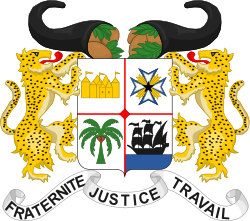 |
|---|
| |
Administrative Council elections were held in Dahomey in 1930. [1]
 |
|---|
| |
Administrative Council elections were held in Dahomey in 1930. [1]
Three members of the Administrative Council were elected from single-member constituencies; Abomey, Ouidah and Porto-Novo. However, the franchise was extremely restricted.
In Porto-Novo, Augustin Nicoué ran against the incumbent Casimir d'Almeida. [1] D'Almeida was supported by the La Voix newspaper, whilst Nicoué was supported by Le Phare du Dahomey.
Despite Nicoué's campaign, Casimir d'Almeida was re-elected. [1]
| Constituency | Elected candidate |
|---|---|
| Abomey | |
| Ouidah | |
| Porto-Novo | Casimir d'Almeida |